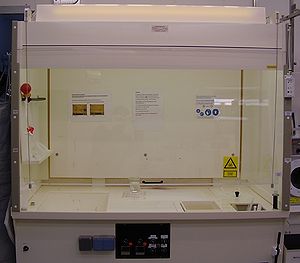Specific Process Knowledge/Etch/Wet Chromium Etch: Difference between revisions
Jump to navigation
Jump to search
No edit summary |
|||
| Line 2: | Line 2: | ||
==Wet etching of Chromium== | ==Wet etching of Chromium== | ||
[[Image: | [[Image:Stinkskab RR2.jpg|300x300px|thumb|Fume hood in cleanroom 2. <br />Wet Etch of Chromium can take place in a beaker in this fume hood]] | ||
Wet etching of chromium at Danchip is done making your own set up in a beaker in a fume hood - preferably in cleanroom 2 or 4. You can see the APV [http://www.labmanager.danchip.dtu.dk/d4Show.php?id=2479&mach=146 here]. | Wet etching of chromium at Danchip is done making your own set up in a beaker in a fume hood - preferably in cleanroom 2 or 4. You can see the APV [http://www.labmanager.danchip.dtu.dk/d4Show.php?id=2479&mach=146 here]. | ||
Revision as of 12:17, 13 September 2013
Feedback to this page: click here
Wet etching of Chromium
Wet etching of chromium at Danchip is done making your own set up in a beaker in a fume hood - preferably in cleanroom 2 or 4. You can see the APV here.
We have two solutions for this:
- Commercial chromium etch (Chrome Etch 18). You can see the KBA here
- HNO3:H2O:cerisulphate - 90ml:1200ml:15g
Etch rate are depending on the level of oxidation of the metal.
How to mix the Chromium etch 2:
- Take a beaker and add 15g of cerisulphate.
- Add a little water while stirring - make sure all lumps are gone.
- Add water until 600 ml - keep stirring (use magnetic stirring)
- Add 90 ml HNO3
- When the cerisulphate is completely dissolved (clear liquid) you can add the other 600 ml of wafer.
Comparing the two wet chromium etches
| Chromium etch 1 | Chromium etch 2 | |
|---|---|---|
| General description |
Etch of chromium |
Etch of chromium |
| Link to safety APV and KBA | see APV here. | see APV here |
| Chemical solution | Chrome Etch 18 | HNO3:H2O:cerisulphate - 90ml:1200ml:15g |
| Process temperature | Room temperature | Room Temperature |
| Possible masking materials | Photoresist (1.5 µm AZ5214E) | Photoresist (1.5 µm AZ5214E) |
| Etch rate | ~ ? nm/min | ~40-100 nm/min |
| Batch size | 1-7 4" wafers at a time | 1-7 4" wafers at a time |
| Size of substrate | Any size and number that can go inside the beaker in use | Any size and number that can go inside the beaker in use |
| Allowed materials | No restrictions.
Make a note on the beaker of which materials have been processed. |
No restrictions.
Make a note on the beaker of which materials have been processed. |
